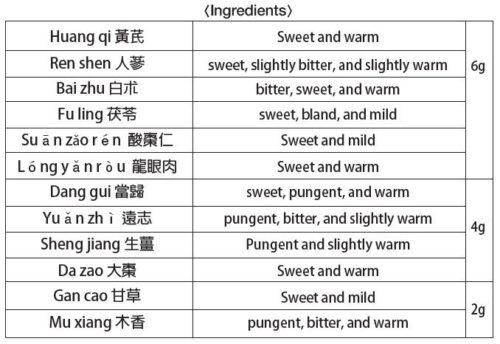
Gui Pi Tang should be used for Yin deficiency patients for the best result
By Ju Bong Kang, KMD
Understanding theories related to the formulation
Too many thoughts and exertion of the mind consume qi, blood, nutrients, and defense(營衛). Neurotic symptoms such as Insomnia, palpitation, forgetfulness, nosebleeds, hematemesis, and metrorrhagia occur due to qi, blood, nutrients, and defense deficiency. Those are caused by blood, qi, nutrients and defense being damaged in the heart and the spleen. Gui Pi Tang treats these symptoms and the syndrome effectively.
The spleen is an organ that produces nutrients and defense from food, and if excessive thoughts and concerns degrade the spleen-qi, the producing nutrients and defense by transformation become insufficient. Therefore, the spleen fails to control the blood bleeding, such as nasal bleeding, metrorrhagia, spitting blood, and hypodermal bleeding may occur.
As for the symptoms caused by the failure of the operation of nutrients and defense, “Nei Jing” explains the mechanism that “suppose nutrients and defense do not follow, goes back to the muscle stria, then an abscess is made.” In response, the commentary said, “When ying goes against, it becomes a blood-stagnation, and when it becomes a blood-stagnation, the heat accumulated and becomes pus, so it becomes an abscess.
“When we look at the contents, it could be understood that if ying-qi fails to proceed, blood stagnation can be made.
Role of each herb in the formula
Gui Pi Tang is a prescription formulated by adding Suan zao ren, Long yang rou, and Yuanzhi to Bu Zhong Yiqi Tang, which treats qi deficiency of the spleen and stomach. The three herbs are effective in stabilizing the mind and treating Insomnia.
The Long yan rou is strongly invigorating qi and blood, which supplies ying blood, i.e., nutrients such as fruit pulp. Therefore, Gui Pi Tang is Bu Zhong Yi Qi Tang with tranquilizing ingredients and Long yuan rou, which provides abundant nutrients.
Huang qi and Long yan ru become monarch drugs among the constituent drugs. Huang qi invigorates the middle energizer, benefits qi, and treats all qi-asthenia and blood deficiency. The herb restores the energy of a person who lacks qi and blood, and in particular, reduces what many thoughts come to mind, relaxes the mind, helps sleep well, and improves insomnia and panic disorder. When a syndrome of qi-deficiency happens, then more thoughts and worries follow, and conversely, when more thoughts and concerns come out, the symptoms of qi deficiency become a little worse. Huang qi recovers all of these symptoms. It just doesn’t work for people with a lot of body heat and who don’t have a weak pulse. Rather, side effects such as headaches may occur.
Long yan rou belongs to the invigorating-blood drugs, but it benefits the heart and spleen, replenishes the qi and blood, supplements ying-blood, and tranquilizes the mind. Therefore it can improve the symptoms of the consumptive disease(虛勞), Insomnia, forgetfulness, palpitation in surprise, worry and fear.
Ren shen, Bai zhu, and Dan gui work as minister drugs.
Rens hen and Bai zhu support Huang qi as benefiting-qi drugs, and Danggui assists Long yan rou as a supplementing-blood drug. Fu ling, Suan zao ren, and Yuan zhi stabilize the spirit. Mu xiang is a qi-regulating drug that controls the all qi-related syndrome at epigastrium and opens the chest, and these become adjuvant drugs.
A patient’s diagnosis should be anemic, pale, or yellowish complexion and mostly soft abdominal muscles to apply the formula. In the abdominal diagnosis, palpitation in the epigastrium or around the navel appears, and the pulse is thin and weak.
Indications
- Those due to the lack of qi and blood, such as Insomnia, forgetfulness, depression, cardiac palpitation, nervous breakdown, shortness of breath, leukemia, emission, scrofula, and others.
- Nosebleeds, vomiting, hemorrhoids, menstrual irregularities, uterine bleeding, etc., are symptoms caused by lack of qi and blood.
Comparing with similar formulas
–Suan Zao Ren Tang: Guipi-Tang’s Insomnia is caused by a qi and blood deficiency in the heart and spleen. And the patient’s complexion is sallow or pale. But Suan Zao Ren Tang’s Insomnia is used to treat the deficiency of the gall bladder to help them fall asleep.
-Zhi zishì Tang: This prescription is not for deficiency of qi and blood. It is used for symptoms such as GPT because of qi-level’s heat-syndrome of the three energizers, which appears as irritable-heat in the chest, limbs-uneasy-heat, fever, etc.
-Wen Dan Tang: Insomnia of this prescription is caused by phlegm retention. Thus the fluid retention in the stomach and borborygmus appear in abdominal diagnosis

































